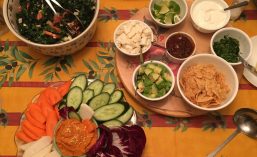While traveling abroad can be a rare and wonderful time, that freedom tends to play havoc with your waistline upon returning home. This article seeks to advise potential travelers on minimizing weight gain and how to stick to their diet while traveling abroad.
Consider Where You Stay
While you may want to stay at a bed and breakfast or a hotel, most of those venues leave you with relatively little to work with when it comes to cooking. Having a few options for food leads to eating unhealthily. Traveling can be tricky for healthy eaters. However, if you are staying in accommodations that offer kitchens, like houses, condos, or even beach houses, you can have more control over your diet by buying groceries and preparing some of your own meals. Even the most basic of inns should have some sort of miniature fridge for you to store your food.
Consider Dining Out at Higher-End Locales
Everyone with dietary or digestive issues knows the dread of hoping their waitress will treat the mention of a dietary issue seriously. The good news is that most high-end restaurants are more than likely than others to alter your meal to suit your needs.
Scout Out the Menus of Local Eateries
Research the local eateries and how far those locations are from where you will be staying. Depending on your stay’s length, you may wish to have a minimum of three to four options to choose from. If all the locations you have picked serve non-regional food of the same type, your taste buds may get burnt out on this new adventure.
Familiarize Yourself with Nutritional Vocabulary
While this advice is mostly of use to people traveling to other countries, it may also prove useful when dining at high-end restaurants that serve ethnic cuisines. In short, you want to know what words like “creamy,” “breaded” and “buttery” look like in the relevant language. These words are a good shorthand for foods that will be loaded with calories. Additionally, you may want to look up specific dishes just to know if you should even bother trying them because you have heard the name before.
The first step in planning a trip is research, so remember to consider your dietary needs in that research. Look for eateries that offer you tools to prepare something more than ramen noodles and coffee. Research local venues and consider frequenting the high priced ones more often. Learn red flag vocabulary for your dietary needs. With the proper research done, you can move on to packing and then set out on your trip.
